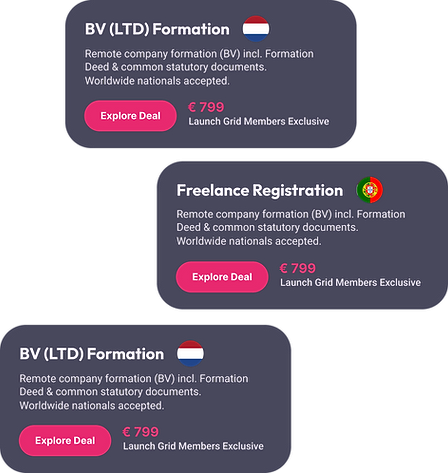With our pre-made company registrations in the Spain, we provide a quick and easy solution for companies that want to start operating immediately. By using a shelf business, you can begin trading right away and avoid the drawn-out incorporation process.
To buy your pre-made business in Spain, use our Entity Management website. With the help of our platform, you can easily purchase a fully registered company and get flexibility and control. You can go through the companies that are accessible, finish the online purchase, and start working immediately.


While new legal entity formation entails starting a corporation from scratch, shelf companies offer an already-existing corporate structure. Seven important points that contrast the two options are listed below.
Time to Operate
Reputation And History
Documentation And Compliance
Costs and Expenses
Business Flexibility
Risk and Legal Exposure
Branding And Identity
Your business needs, level of urgency, and risk tolerance will all play a role in your decision between incorporating a shelf company and a new legal entity. Every choice offers benefits, ranging from full customisation with a new organization to instant operations with a shelf company.
The process of transferring a Dutch shelf company is rapid and effective. The transfer entails less paperwork and legal obstacles because pre-registered businesses are prepared for purchase. Our staff takes care of the required paperwork, including updating the business's Dutch Chamber of Commerce registration, to guarantee a smooth transfer.
This guarantees that you can begin commercial operations right away by enabling you to take over an existing corporation in a matter of days. Shelf companies offer your organization a risk-free base because they have spotless records and no outstanding debts. Our professionals expedite the transfer procedure, saving you time and facilitating a seamless change of ownership.
An effective substitute for creating a new legal entity is a shelf company. Bypassing the drawn-out incorporation process, these pre-registered corporations are available for use right now. You can obtain an established business structure, compliance records, and, in certain situations, a business history by buying a shelf company.
For business owners who want to capitalize on an established company's reputation or who must launch operations rapidly, this is the best choice. Shelf businesses offer a hassle-free path to business ownership, save time, and simplify legal issues.
"The speed and simplicity of acquiring a shelf firm amazed me. The procedure went well, and I was able to get my business up and running right away."
 John M.
John M."Their professional support made the entire transfer process smooth. I now own a ready-to-use company with no hassle at all. Highly recommend!"
 Sarah L.
Sarah L."The shelf company I purchased came with a solid reputation, which helped boost my business credibility right away. Excellent service and communication throughout the process!"
 David K.
David K.Are you interested in purchasing an established Dutch company? Our pre-made Dutch firms allow you to enter the market quickly and easily, saving you the trouble of creating a new company. You can begin operations right away by using a shelf company, which gives you an established business structure, a corporate history, and a tax-efficient configuration.
Our staff guarantees a smooth transfer of ownership by providing knowledgeable direction at each legal and administrative stage. Our ready-to-go business alternatives will help you launch your company in Spain swiftly and effectively. Contact us now to find out more!








Many entrepreneurs might not completely understand the benefits of starting a business overseas. Access to a wider range of clientele, fresh growth prospects, and higher profits are all made possible by entering foreign markets. Business owners can decide on their international expansion plans with knowledge of these advantages.
Navigating the target country's legal and regulatory systems is an essential part of starting a business abroad. Every country has its own set of regulations that control everything from taxation to company registration. It is imperative that one become familiar with these requirements to guarantee compliance and steer clear of any legal hazards. This procedure can be streamlined by working with local legal professionals, making it simpler to establish a presence in the new market.
The significance of creating a global network is another essential component of starting a business successfully overseas. Building relationships with regional partners, suppliers, and consumers can yield insightful information about consumer behavior and industry trends. Additionally, networking might provide access to resources and collaboration opportunities that might not be available in the entrepreneur's own nation.
Finding the right structure that fits your objectives is crucial when creating a new entity. Limited liability companies (LLCs), corporations, partnerships, and sole proprietorships are examples of common organizational forms. Liability protections, tax duties, and legal ramifications vary by type. By investigating these choices, you may make an informed choice that meets your business needs.
Choosing a distinctive company name that conforms with local laws is the first of several crucial phases in the formation process. The next step is to submit the required paperwork to the appropriate government agency, including articles of incorporation. Depending on your jurisdiction, you might also be required to pay a registration fee. Making sure your company name complies with state naming regulations and isn't already in use is very important.
Following incorporation, your company must continue to adhere to all applicable laws, including acquiring the licenses and permissions required for lawful operations. Zoning permits, industry-specific rules, and business licenses are a few examples of this. Maintaining good standing also requires regular files, such as tax returns or yearly reports. Being aware of these compliance requirements guarantees that your company runs lawfully and keeps you out of trouble.
Professional services specialize in handling all aspects of documentation required for company registration. This includes preparing and reviewing essential documents such as the articles of incorporation, shareholder agreements, and identification verification. By utilizing their expertise, businesses can avoid common pitfalls and ensure that all paperwork is accurately completed and compliant with local laws. This streamlined management minimizes the risk of delays and rejections, allowing for a smoother registration process.
Navigating the legal requirements for company registration can be complex and time-consuming. Professional services offer invaluable guidance, helping clients understand the specific regulations in their jurisdiction. They stay updated on any changes in law, ensuring that the registration process meets all necessary criteria. Their experience allows businesses to confidently navigate the regulatory landscape, reducing the likelihood of errors that could lead to costly fines or legal complications.
Once all documentation is prepared, professional services can efficiently submit the registration application on behalf of the client. Their established relationships with local authorities can expedite the process, resulting in quicker approval times. By managing all interactions with government agencies, they free up valuable time for business owners, allowing them to focus on other crucial aspects of their operations while ensuring compliance and efficiency in the registration process.
Starting a global business is an exciting yet tricky undertaking. Understanding regional marketplaces, cultural variances, and legal frameworks are just a few challenges entrepreneurs must overcome. Because every nation has different chances and difficulties, in-depth study and market analysis are crucial. Recognizing possible dangers and rewards requires a thorough awareness of the landscape.
Developing a solid business plan is essential for success abroad. This entails knowing pricing tactics and distribution methods and outlining your offerings for goods and services. Putting together a trustworthy team with knowledge of marketing, international business, and legal compliance is essential to laying a solid foundation. This multicultural team will ensure alignment with your business objectives while assisting you in navigating the difficulties of various markets.
The road doesn't stop when your business is operational. Due to the dynamic nature of global marketplaces, companies must remain adaptive and agile. You may improve your tactics and stay relevant by routinely observing competitors, industry trends, and consumer feedback. Adopting an attitude of continual improvement will enable your business to prosper in a constantly changing world.
Hiring professionals for assistance can significantly enhance your business's success. Experts such as accountants, lawyers, and marketing specialists bring valuable knowledge and experience. They can help you navigate complex legal regulations, manage finances efficiently, and develop effective marketing strategies.
Additionally, using consultants' expertise might yield new perspectives and creative answers to problems you may encounter. By spending money on expert help, you can concentrate on your primary company operations while maintaining compliance and achieving peak performance, eventually resulting in long-term success and growth for your enterprise.
A legally formed, pre-registered corporate entity with no past operations or liabilities is known as a shelf company. Because it is "on the shelf" and ready for use right away, customers can avoid the drawn-out incorporation process.
Buying a shelf company saves time and enables quick operations by giving you immediate access to an established business organization. Because of its well-established past, it can also provide credibility, which could help partnerships and funding.
A shelf company specialist helps pre-registered businesses with acquisition, ownership transfer, legal compliance, and administrative setup. From purchasing to operational preparedness, they guarantee a seamless process.
Yes, you can change the name, business activities, and other details after purchasing a shelf company, with assistance from legal experts to ensure compliance with local regulations.
Stay updated with the latest news and exclusive offers. Subscribe to our newsletter for regular insights delivered to your inbox!